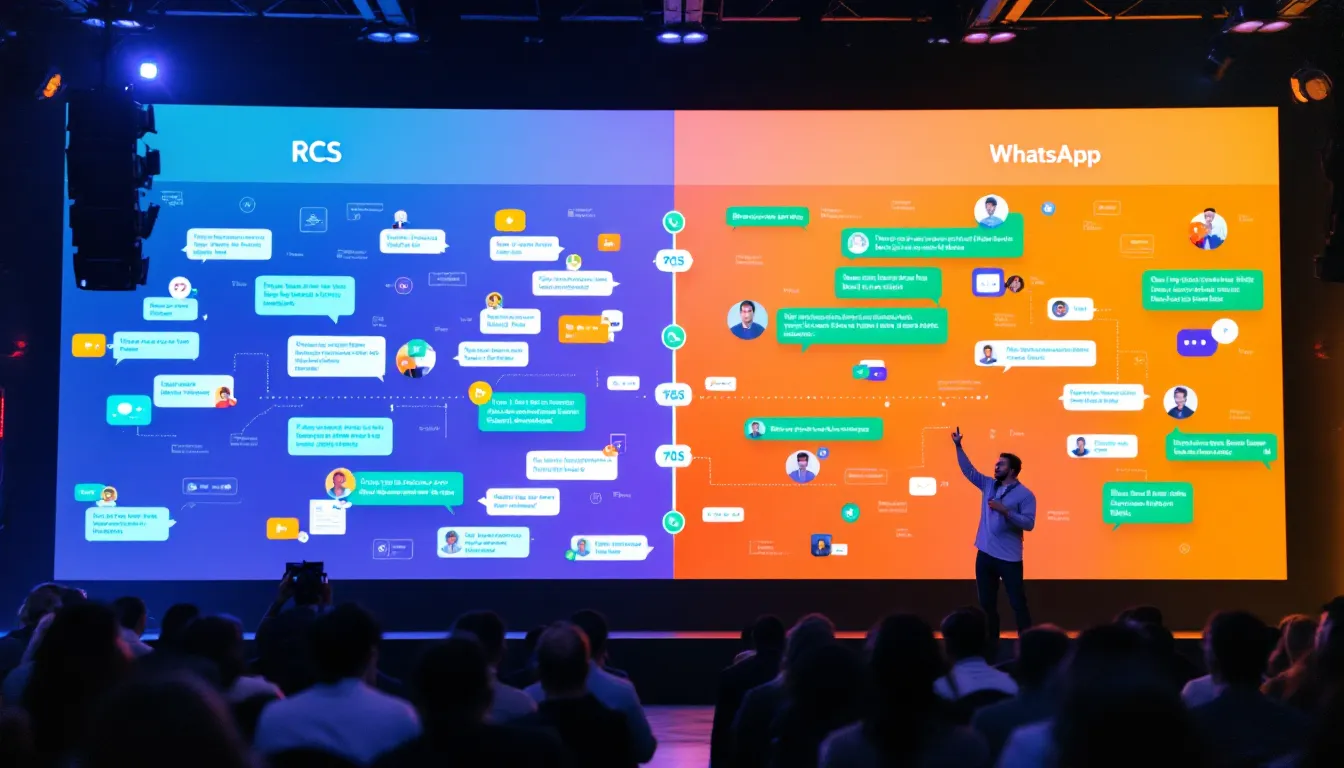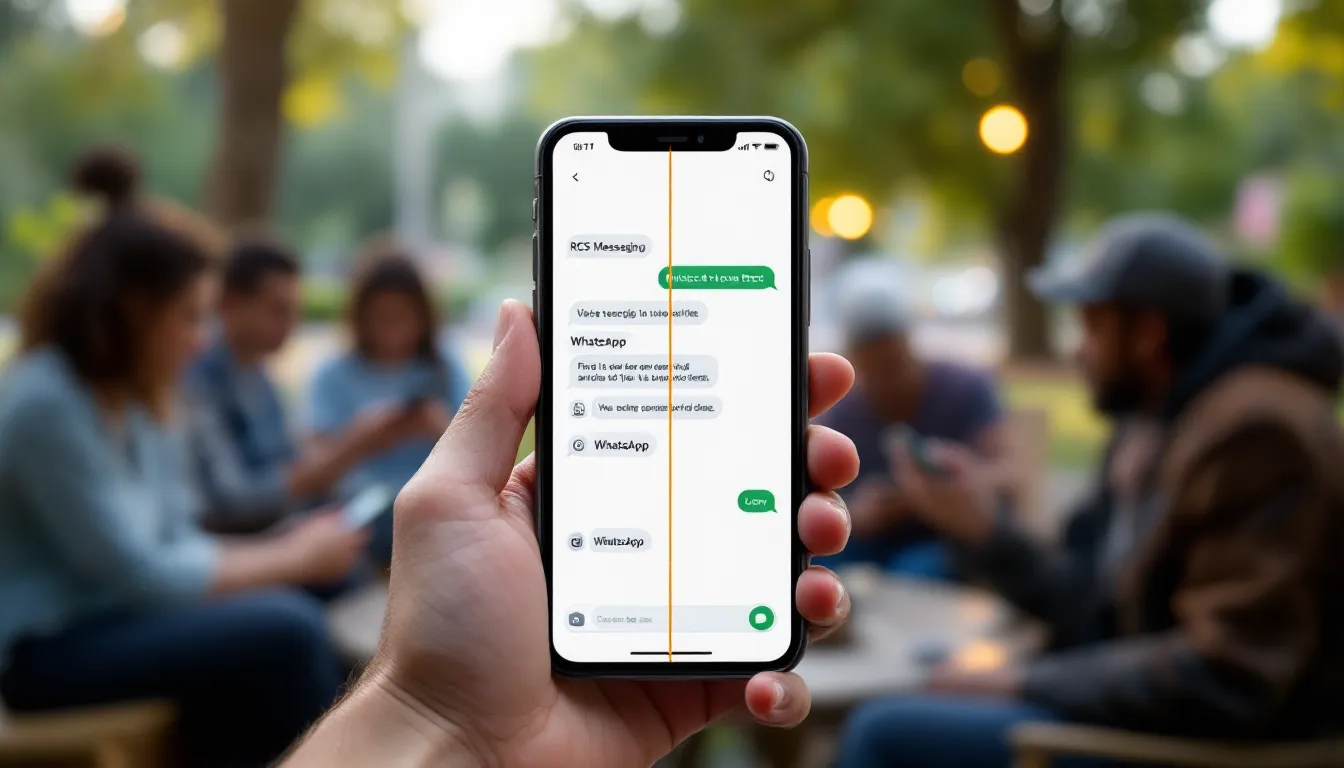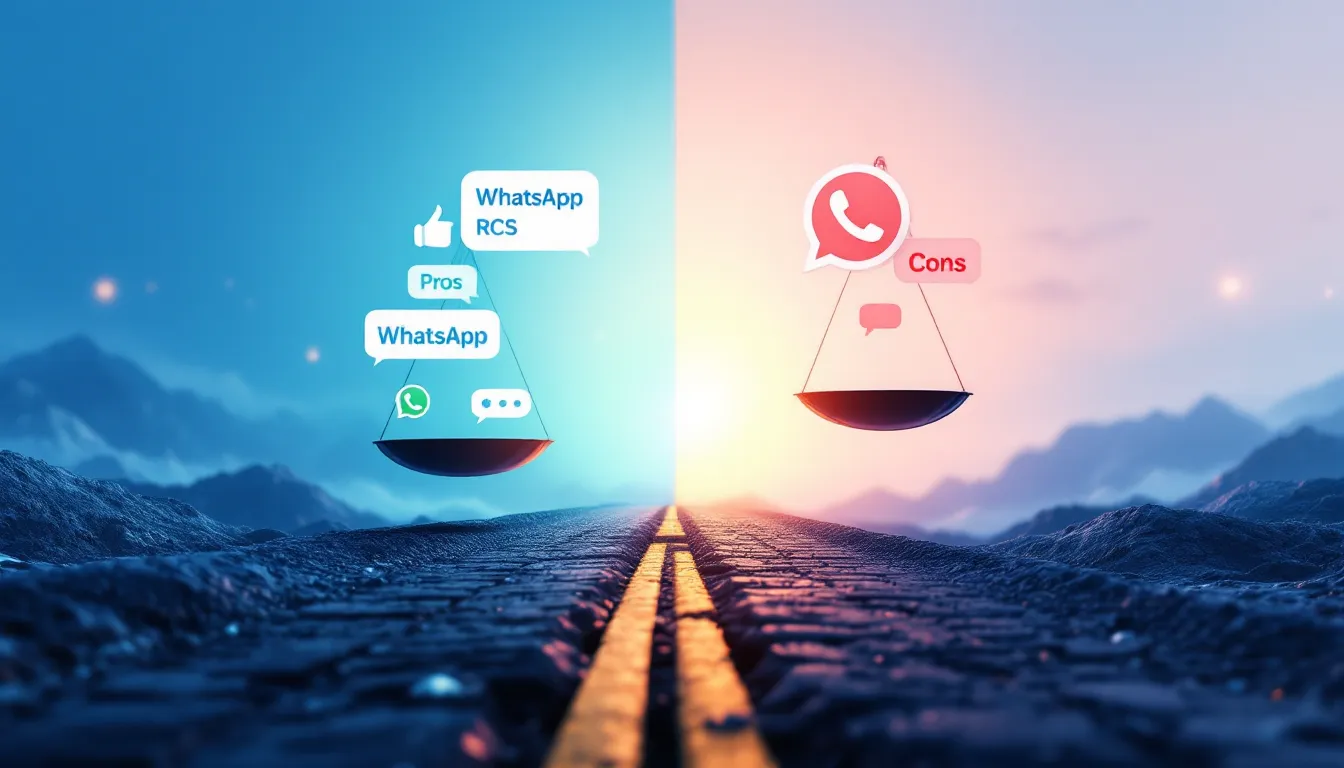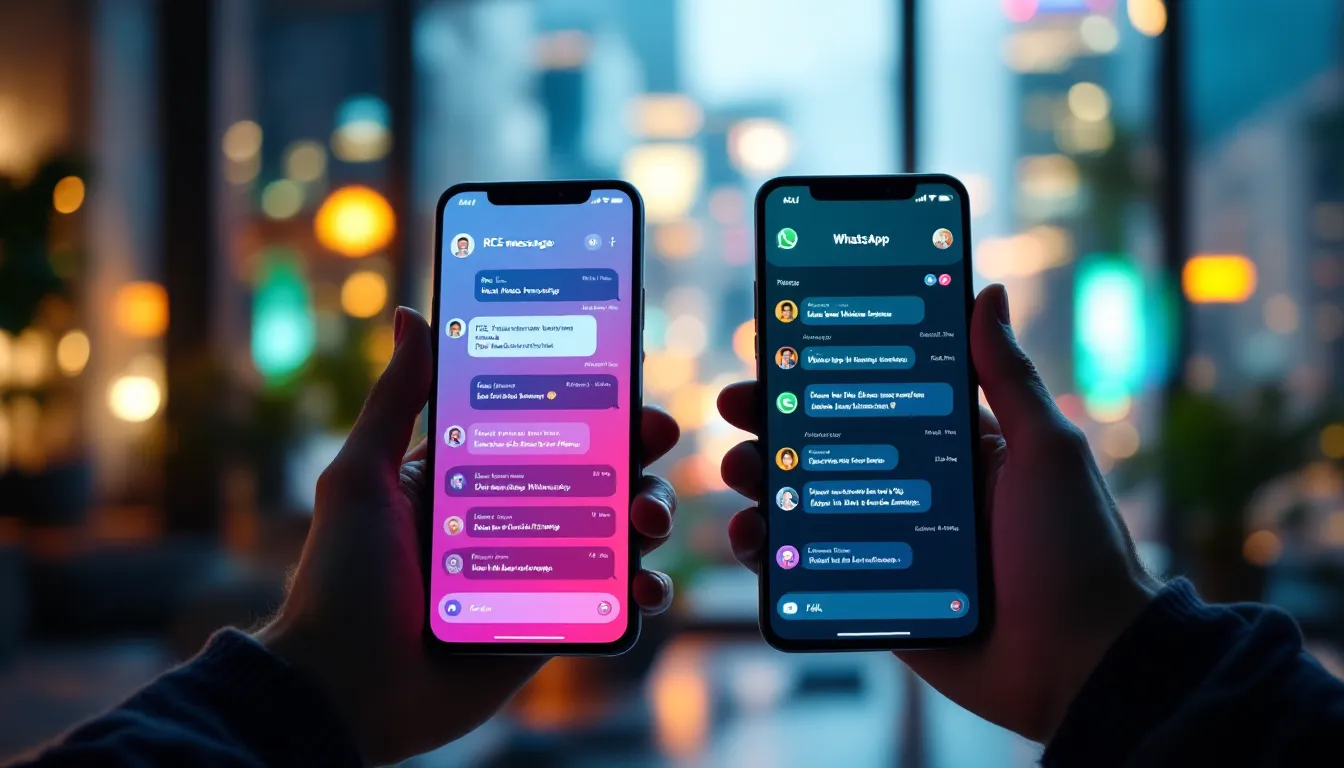Understanding Rich Messaging
In today’s rapidly evolving digital communication landscape, rich messaging has emerged as a key player in enhancing the way we interact. Rich Communication Services (RCS) and popular instant messaging platforms like WhatsApp are at the forefront of this transformation. Understanding their fundamentals and functionality is crucial for discerning users who seek effective communication tools.
Defining Rich Communication Services (RCS)
Rich Communication Services (RCS) is an advanced messaging protocol that aims to enhance standard SMS messages with rich media and interactive features. Unlike traditional SMS, RCS supports group chats, high-resolution photo sharing, read receipts, and more. The defining characteristic of RCS is its ability to seamlessly integrate new features that rely on an internet connection, making messaging more versatile and engaging.
The implementation of RCS allows businesses to connect more vividly with customers, offering interactive elements such as carousels, quick reply buttons, and location sharing. This transformation ushers in a new era of connectivity, enabling brands to provide better customer service through customized experiences. Additionally, RCS enables brands to send rich media messages that can include videos, images, and even interactive polls, allowing for a more engaging dialogue with consumers. This level of interaction not only enhances user experience but also significantly boosts engagement rates, making it a powerful tool for marketers.
What is WhatsApp?
WhatsApp, on the other hand, is an immensely popular messaging application that has revolutionized private communication since its launch in 2009. Known for its end-to-end encryption, WhatsApp prioritizes user security while providing a platform for sending text messages, voice notes, images, videos, and documents. The app has become a critical tool for both personal and professional communication globally.
With over two billion users, WhatsApp has established itself not just as a messaging service but also as a platform for businesses. Companies can create WhatsApp Business accounts, allowing them to interact with customers through automated responses, official business profiles, and even catalog sharing to drive sales. Furthermore, WhatsApp's integration with other services, such as payment systems, has enabled businesses to facilitate transactions directly within the app, streamlining the customer journey. This capability not only enhances convenience for users but also opens up new avenues for businesses to engage and retain their customer base, making WhatsApp an indispensable tool in the modern digital economy.
The Evolution of RCS and WhatsApp
The journey of RCS and WhatsApp has been marked by technological advancements and consumer demands. Tracking their evolution provides insight into their current features and user experiences.

The Journey of RCS
RCS began gaining traction in the mid-2010s. It was initially developed by the GSMA, with the aim of creating a standard that would enable enhanced messaging features across various carriers and devices. Major mobile operators began adopting RCS, and Google played a key role by integrating it into its Android Messages app.
Despite initial setbacks, such as fragmentation and inconsistent support across carriers and devices, RCS has demonstrated resilience. As more companies embraced the protocol, it began to evolve into a competitive alternative to traditional messaging apps. The rollout of RCS has strengthened its presence in markets worldwide, further bridging the gap between SMS and full-fledged messaging applications. Features such as read receipts, typing indicators, and high-resolution image sharing have made RCS a more appealing option for users who crave a richer messaging experience. Additionally, the integration of chatbots and business messaging capabilities has opened new avenues for brands to engage with consumers, transforming RCS into a platform that not only facilitates personal communication but also enhances customer service and marketing strategies.
WhatsApp's Path to Success
WhatsApp's journey is characterized by rapid growth and innovation. Starting off as a simple messaging app, it quickly expanded its functionalities by introducing features like voice and video calls, stickers, and status updates. A strategic acquisition by Facebook in 2014 provided WhatsApp with the resources to enhance its user experience further and expand its global footprint.
Today, WhatsApp operates in over 180 countries and continues to adapt to user needs. By implementing features like end-to-end encryption and the ability to send larger files, WhatsApp has solidified its position as a leader in the messaging industry. The app has also made strides in enhancing user privacy and security, responding to growing concerns over data protection. Furthermore, WhatsApp's introduction of business accounts has allowed small and large enterprises alike to connect with customers more effectively, offering support and facilitating transactions directly through the app. This shift not only caters to the evolving demands of consumers but also positions WhatsApp as an essential tool for modern commerce, blending personal communication with business functionality seamlessly.
Features Comparison: RCS vs WhatsApp
A comprehensive comparison of features reveals both similarities and differences, informing users about their options. Each platform possesses strengths that cater to diverse communication preferences.
User Interface and Experience
When comparing user interfaces, WhatsApp is often praised for its user-friendly design. The app employs a straightforward layout that allows users to effortlessly navigate through chats and contacts. Features, such as the ability to send quick voice messages and create groups, enhance user experience without overwhelming the interface.
Conversely, RCS, while still evolving, often faces challenges related to interface consistency across different devices and networks. As RCS is an evolving protocol integrated into various messaging apps, user experiences may vary depending on the carrier's implementation and the smartphone used. Nevertheless, RCS aims to provide a similar level of user-friendliness as WhatsApp as it matures. Additionally, RCS is designed to support richer interactions, such as read receipts and typing indicators, which can improve real-time communication. As more carriers adopt RCS, the hope is that the user interface will become more standardized, providing a seamless experience across different platforms.
Message Encryption and Security
In terms of security, WhatsApp stands out with its commitment to privacy, employing end-to-end encryption by default. This means that only the sender and recipient can read the messages, providing peace of mind to users concerned about security.
RCS, while supporting typical security measures, has traditionally lagged in this domain, with threats of potential vulnerabilities due to its reliance on mobile carriers. However, efforts are underway to enhance security within RCS, with certain implementations beginning to adopt encryption, though not universally applied as in WhatsApp. As the protocol continues to develop, there is a growing emphasis on ensuring that user data is protected, which may include features like two-factor authentication and improved data handling practices, making RCS a more secure option in the future.
Multimedia Messaging Capabilities
Both platforms support rich multimedia messaging capabilities. WhatsApp allows users to share photos, videos, voice messages, and documents easily. Features like disappearing messages and status updates have kept WhatsApp in tune with modern communication trends.
RCS also enables high-resolution photo sharing, video clips, and enriched content such as interactive cards. Businesses can utilize RCS for promotional effects, embedding links and CTAs directly within messages, thus enhancing user engagement. Furthermore, RCS supports larger file sizes compared to traditional SMS, allowing users to share more substantial media without the hassle of compression. This capability is particularly beneficial for businesses looking to communicate more effectively with their customers, as they can send high-quality images and videos that better represent their brand and offerings. As RCS continues to evolve, the potential for more innovative multimedia features, such as augmented reality elements, could further enhance the user experience and engagement levels.
Accessibility and Compatibility
Accessibility and compatibility play significant roles in determining user preferences for RCS and WhatsApp. With an understanding of the device requirements, users can make informed choices.

Device and Platform Compatibility of RCS
RCS is designed to work on any device that supports the service, provided that the carrier has implemented it. However, not every mobile operator currently offers RCS, leading to varied experiences based on geographic location. Users may encounter limitations if their devices are not compatible with RCS functionalities, which can hinder its adoption. Moreover, the implementation of RCS features can differ significantly between carriers, with some offering a richer set of functionalities such as read receipts and typing indicators, while others may provide a more basic experience. This inconsistency can be frustrating for users who expect a uniform experience across different networks.
Additionally, RCS relies heavily on the carrier's infrastructure, which can pose challenges in areas with poor network coverage. Users in rural or less developed regions may find themselves unable to utilize RCS effectively, further widening the gap in communication capabilities. As RCS continues to evolve, it will be crucial for mobile operators to enhance their networks and ensure that all users, regardless of their location, can access these advanced messaging features.
WhatsApp's Global Reach and Compatibility
WhatsApp enjoys widespread compatibility across multiple devices and operating systems, including iOS and Android, assuring users a consistent experience. The app’s availability on desktops and web browsers expands its usage even further, facilitating seamless communication regardless of the device in use. This cross-platform compatibility has undoubtedly contributed to its widespread acceptance and popularity. Furthermore, WhatsApp's ability to function on low-bandwidth networks makes it an appealing option for users in developing countries, where internet connectivity can be sporadic and unreliable.
WhatsApp also prioritizes user accessibility by offering features such as voice messaging, video calls, and group chats, which cater to diverse communication needs. The app supports multiple languages, making it accessible to a global audience. This inclusivity fosters a sense of community among users from different cultural backgrounds, enhancing the overall user experience. As WhatsApp continues to innovate and introduce new features, its commitment to accessibility and compatibility will likely keep it at the forefront of messaging apps worldwide.
Pros and Cons of RCS and WhatsApp
Every technology comes with its own set of advantages and disadvantages. Analyzing the pros and cons of RCS and WhatsApp helps users gauge their suitability for individual needs.

Advantages of Using RCS
One of the primary advantages of RCS is that it is integrated directly into the native messaging apps of most Android devices. Users do not need to download an additional app, making it accessible to a broad audience. Additionally, RCS allows for more interactive and engaging messaging experiences, enhancing customer support and business communication. Features such as read receipts, typing indicators, and high-resolution image sharing elevate the user experience, making conversations feel more dynamic and connected. This can be particularly beneficial for businesses looking to enhance customer engagement, as RCS supports rich media content and interactive buttons that can lead to immediate actions, such as making a purchase or booking an appointment.
Drawbacks of RCS
Conversely, RCS is still in the rollout phase in many countries and often lacks consistency. Many users may not have access to RCS features, especially if their carriers have yet to embrace the technology. This can lead to a divided user experience, where the benefits are not uniformly accessible. Moreover, the reliance on mobile carriers for RCS functionality can create additional hurdles, such as varying levels of support and potential delays in feature availability. Users who frequently communicate across different networks might find the inconsistencies frustrating, as messages may not display the same features or reliability as they would on a fully supported platform.
Benefits of WhatsApp
WhatsApp's primary benefits include its robust end-to-end encryption and widespread user base, making it a trusted option for secure communication. The app's features are regularly updated, providing users with fresh functionalities and improvements. Its integration with business solutions allows companies to leverage the platform effectively for marketing. Additionally, WhatsApp supports voice and video calls, which can be a significant advantage for users looking to connect in real-time without incurring traditional call charges. The ability to create groups and broadcast messages also fosters community engagement, making it easier for users to stay connected with friends, family, or even professional networks.
Limitations of WhatsApp
On the flip side, WhatsApp does have some limitations. Users are often required to share their phone numbers, potentially compromising privacy for those who prefer anonymity. Furthermore, while WhatsApp is user-friendly, it may lack some of the advanced functionality and business integrations that RCS aims to provide. For instance, businesses using WhatsApp may find themselves limited by the app's restrictions on automated messaging and customer support tools, which can hinder their ability to provide timely responses to inquiries. Additionally, the app's reliance on internet connectivity means that users in areas with poor service may experience delays or interruptions in communication, which can be frustrating in urgent situations.
Future Predictions for RCS and WhatsApp
The landscape of messaging platforms is continuously changing, with predictions suggesting significant advancements for both RCS and WhatsApp in the coming years.
RCS: What's Next?
RCS is expected to grow in capabilities as more carriers and manufacturers adopt the technology. As its features expand and improve, we may witness enhanced security protocols and greater integration with other communication and business tools. The potential to streamline customer interactions and provide rich media experiences will likely be at the forefront of RCS development. Additionally, the introduction of features such as read receipts, typing indicators, and group chats will enhance user engagement, making RCS a more appealing option for both individuals and businesses. As businesses increasingly recognize the importance of customer experience, RCS could become a vital tool for marketing campaigns, allowing companies to send personalized messages, promotions, and updates directly to users in a visually rich format.
The Future of WhatsApp
WhatsApp is anticipated to further strengthen its security measures and expand its offerings for business users. With the growing emphasis on privacy, continuous enhancements to its encryption protocols are likely. Furthermore, WhatsApp may invest in emerging technologies such as AI to deliver personalized and automated customer support. This could involve the development of chatbots capable of handling common inquiries, thereby freeing up human agents for more complex issues. As the platform continues to evolve, we might also see the introduction of new features aimed at enhancing user interaction, such as video calls with augmented reality capabilities or integration with virtual assistants to facilitate seamless communication. The potential for cross-platform functionality could also expand, allowing users to connect with friends and family across different messaging services, further solidifying WhatsApp's position as a leader in the messaging space.
Conclusion: RCS vs WhatsApp - Which is the Better Option?
Ultimately, the choice between RCS and WhatsApp boils down to individual preferences and specific use cases. While RCS offers promising enhancements and potential benefits for businesses, WhatsApp stands out with its established user base and secure communication features.
For casual users primarily seeking a reliable messaging solution, WhatsApp’s robust features and extensive compatibility may provide the best experience. Meanwhile, businesses looking to leverage dynamic messaging capabilities might find RCS more aligned with their needs. As technology continues to evolve, both platforms hold the promise of enriching our communications in distinct yet impactful ways.
Enhance Your Business Messaging with nativeMsg
As you consider the future of your business communication, nativeMsg stands ready to elevate your messaging strategy. Embrace the power of RCS Business Messaging and transform your customer interactions into dynamic, interactive experiences. With nativeMsg, you're not just sending messages; you're engaging customers, boosting conversions, and streamlining your communication efforts—all through a user-friendly platform. Don't let your business fall behind in the digital age. Get Started with nativeMsg today and revolutionize the way you connect with your audience.

